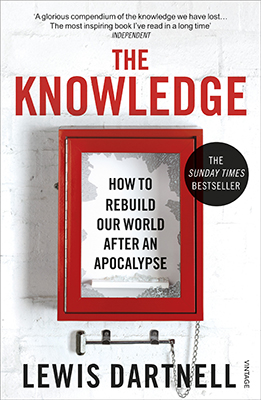The Apocalypse
Philip Strange spoke to astrobiologist, science writer and broadcaster, Dr Lewis Dartnell.
The world as we know it has ended!
Perhaps a huge asteroid struck the planet, fatally changing the climate, killing millions, or …
A thermonuclear war left a few survivors struggling to cope with a nuclear winter, or …
A deadly virus spread rapidly across the planet, killing most of the population …
It doesn’t really matter what happened. What matters is that you and a small proportion of the world’s population survived. What would you do? How would you live? How much of our current technologically advanced civilisation would you try to re-establish? How much could you re-establish?
For most people this is the stuff of science fiction novels or disaster movies and we carry on our lives oblivious to how much we depend on science and technology. Worse still, we have become disconnected from the basic processes that underpin our lives and would be helpless faced with having to produce our own food,
clothing or even medicines.
The Apocalypse would expose a terrifying skills gap.
This is where Lewis Dartnell’s recent best-selling book, The Knowledge (how to rebuild our world after an apocalypse) steps in. Dartnell imagines a post-apocalyptic world and the challenges facing survivors. He then provides enough practical knowledge of science and technology to help survivors re-establish a simple life style, and describes enough basic science to allow them to move on and relearn for themselves. For example, we read about how to grow food, generate power, prepare medicines, make basic chemicals and how to get metals out of rocks. It’s a post-apocalyptic self-help guide but also an impressively wide ranging celebration of modern science and technology and how it underpins our lives. Dartnell writes engagingly and lucidly although with such broad coverage some may feel their favourite topic has been underplayed.
The Knowledge was a Sunday Times and New York Times best-seller and Sunday Times “New Thinking” book of the year in 2014. I began by asking Lewis Dartnell why he thought it had been so popular. “One reason, I believe, is that it covers a very nice self-contained topic that people had been thinking about—how would you start again from scratch if the world ended? What do you need to know to progress again? Taking one fundamental example, how do you grow food, store seed and even make a simple plough? “
Writing a book is a major undertaking so I asked him why he had chosen this particular subject. He told me that he had been driven “as a scientist, by curiosity, plain and simple”. He had wanted to find a way of describing the most important scientific discoveries through which civilisation had progressed to its current technologically advanced state. Surprisingly, he had based the book around the apocalypse only to provide a useful framework upon which to hang these ideas.
One of the impressive aspects of the book is its breadth and I wondered how he had arrived at such a broad understanding of science and technology? “Hard work”, he told me, “I read a lot; if you look in the bibliography there are 400 references. I checked facts with experts. I also wanted to try out some of the basic technology myself so I had a go at making glass from scratch and I spent a day with a blacksmith working with metals.”
Survivors of the Apocalypse would find themselves in a very inhospitable environment but I wondered if it offered humans the chance for a fresh start, perhaps to set up a better life? “There is this allure of the post-apocalyptic society where we might learn from our past mistakes, but”, as he explained, “we should be very wary; there is no guarantee that society will remake itself after an apocalypse. History teaches us that many advanced civilisations have prospered, only to stall and disappear altogether. We are not invulnerable; we face many challenges (climate change and soil erosion to name but two) and could lose all we have achieved.”
Part of this inhospitable post-apocalyptic environment will be a breakdown of law and order; would society be able to move forward under such adverse conditions? “Some people will inevitably take advantage of the absence of control, the collapse of policing and it will become a bit wild.” But he went on to say that he had faith in the human spirit; humans would eventually work to help one another.
So, with all this negative talk, did the threat of the Apocalypse keep him awake at night? “No, there is no reason to expect an apocalypse any time soon but there are plenty of other issues to be concerned about. Climate change is one,” he explained, “but we know how to solve the problem, it’s just the political will that is lacking.”
A particularly novel aspect of the book is its linked website (the-knowledge.org) and I wondered how successful this had been? “I see the book as just the start of a discussion,” he explained, “the website has been very successful in getting that discussion going, allowing people to express their own ideas, and of course I have learnt so much from it”. The website also provides lots of additional material and background information about The Knowledge.
As well as writing best-selling books, Lewis Dartnell works at the University of Leicester Space Research Centre where he is an astrobiologist. I asked him to explain what that means: “I am trying to find evidence for life on other planets. My research focus is looking for bacteria on Mars and I am searching for traces in meteorites derived from the Red Planet. Why is this important? If I can find evidence for bacteria, this would show that we are not alone, the Earth is not the only place where life has evolved and that would be very exciting.”








